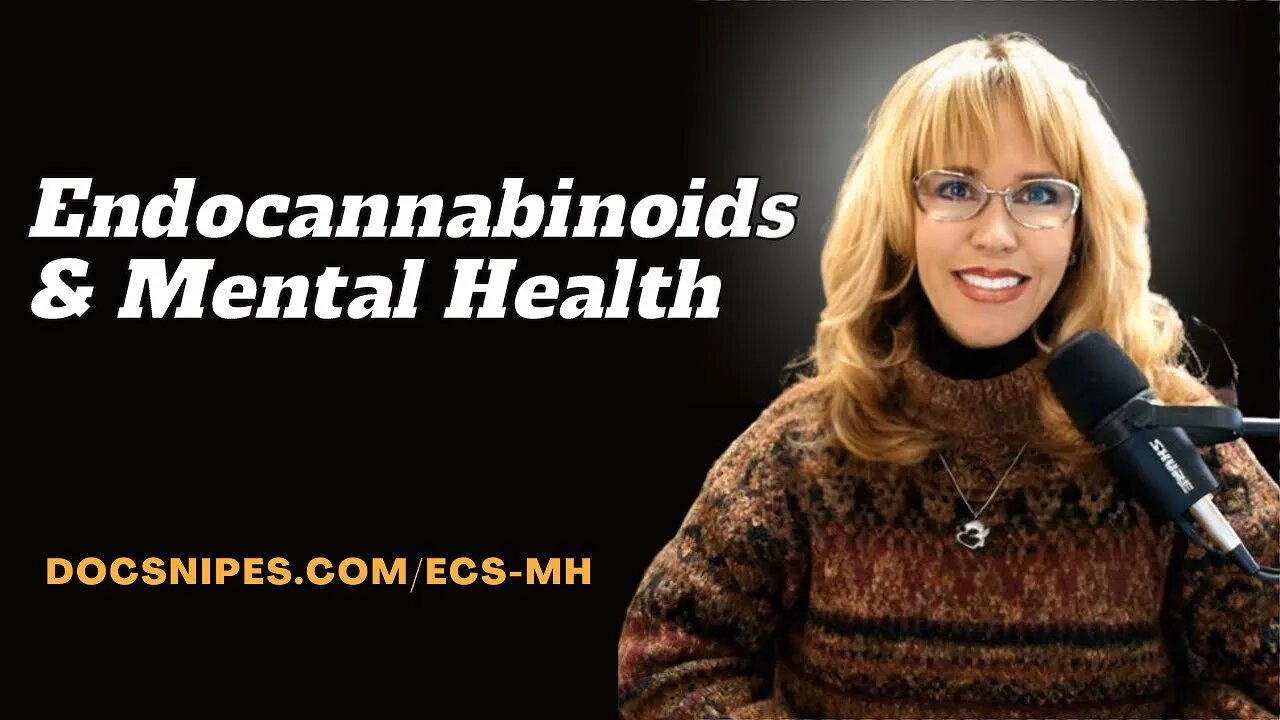Premium Only Content

Endocannabinoids and Mental Health
📢SUBSCRIBE and click the BELL to get notified when new videos are uploaded.
💲 Unlimited CEUs $59 based on these videos at https://allceus.com/catalog CEUs available at: http://allceus.com/member/cart/index/product/id/1461/c/
for social work, counseling, marriage and family therapy, addiction counseling, case management, pastoral counseling and more.
Endocannabinoids and Mental Health
#CBD #Mentalhealth #cannabis
Dr. Dawn-Elise Snipes
Objectives
~ Explore the role of the endocannabinoid system in
~ Mood disorders
~ Cognitive disorders
~ Autoimmune and inflammatory disorders
~ Pain
~ Stress
Intro
~ The eCB system targets both monoamines and the HPA axis, which is also dysregulated during stress-induced psychiatric disorders
~ Hyperactivity of endocannabinoid signaling contributes to excessive intake and storage of high-calorie foods, while endocannabinoid hypoactivity is a risk factor for the development of depression, anxiety and post-traumatic stress disorder
~ The ECS is comprised of endogenous cannabinoids (endocannabinoids), cannabinoid receptors, and the enzymes responsible for the synthesis and degradation of endocannabinoids
~ Endogenous cannabinoids are endogenous lipids that engage cannabinoid receptors
~ The first discovered and best-characterized endocannabinoids are anandamide (arachidonoyl ethanolamide) and 2-arachidonoyl glycerol (2-AG)
~ Both 2 AG and anandamide are agonists for CB1 and CB2 receptors
~ In systems with low receptor expression, anandamide can antagonize the effects of more efficacious agonists
~ On demand, endocannabinoids are liberated in and released into the extracellular space. This contrasts with classical neurotransmitters that are synthesized ahead of time and stored in synaptic vesicles
~ CB1 receptors are abundant in the central nervous system (CNS), particularly in cortex, basal ganglia, hippocampus, and cerebellum
~ CB2 receptors are expressed at much lower levels in the CNS
~ Physical exercise mobilizes endocannabinoids, which could contribute to refilling of energy stores and also to the analgesic and mood-elevating effects of exercise.
~ A second important role for endocannabinoid signaling is to restore homeostasis following stress
ECS and Neurotransmitters
~ Changes in the ECS are involved in several psychiatric disorders.
~ Serotonin
~ eCBs reduce serotonin release in the CNS via the activation of CB1 receptors
~ Early evidence for a role of eCB signaling in the regulation of the 5-HT system suggests a high level of functional overlap between the 5-HT and eCB systems. Both 5-HT and eCB systems regulate body temperature, feeding, sleep and arousal and emotional processes
~ Dopamine
~ CB1 receptors tightly regulate DA neuronal activity
~ CB1 receptors are expressed at presynaptic inputs to DA neurons and facilitate or suppress DAergic neuron activity depending on their location
Alzheimer’s and Neurodegenerative Disorders
~ Cannabinoid receptor agonists such as AEA have been shown to provide protection against neurotoxicity
~ Activation of CB1 and CB2 attenuates Aβ (beta amyloid)-induced neuroinflammation, neurodegeneration and spatial memory impairment
Pain and Inflammation
~ Activation of the CB2 and adenosine receptors leads to a decrease oxidative stress and inflammation
~ CBD is one of the main pharmacologically active phytocannabinoids
~ It is non-psychoactive, but has many beneficial pharmacological effects, including anti-inflammatory, antioxidant, anxiolytic, antidepressant, antipsychotic, and anticonvulsant properties
Anxiety
~ Chronic stress and steroid treatments are both known to impair endocannabinoid signaling at multiple levels,
~ Stress-related down-regulation of the CB1 receptor leads to greater changes in glutamatergic signaling and excitotoxicity within the PFC following chronic stress
~ It has been repeatedly shown that CBD and THC concurrently decrease anxiety and depression
~ Essential oils, terpenes can activate CB1 and CB2 receptors and are associated with cognitive and mood effects.
Interventions
~ Omega-3 and 6 fatty acids
~ Flavonoids which inhibit endocannabinoid degradation
~ Meditation
~ Exercise
~ Sex
Summary
~ The endocannabinoid system interacts with most other bodily functions and neurotransmitters.
~ Problems in the ECS are associated with
~ Chronic pain and inflammation
~ GI disorders
~ Mood disorders
~ Neurodegenerative disorders
~ Metabolic disorders
~ Endocannabinoids are created partially from lipids, particularly Omega 3 and 6s
~ Reducing HPA-Axis activation and increasing serotonin and dopamine will all increase EC levels
TIMESTAMPS
00:00 Beginning
01:49 Introduction to the endocannabinoid system
17:35 Endocannabinoid system and neurotransmitters serotonin and dopamine
31:10 Gut Health and the Endocannabinoid Receptors
38:27 ECS and Pain and inflammation
-
 39:10
39:10
DocSnipes
2 years agoTransform Toxic Guilt and Shame: Empowering CBT Methods
243 -
 2:28:53
2:28:53
Inverted World Live
6 hours agoMurder Tourism, Truth Police, & ChatGPT Weddings | Ep. 141
139K6 -
 2:58:44
2:58:44
TimcastIRL
5 hours agoTrump DOJ Opens Probe Into Democrat Swalwell For Mortgage Fraud | Timcast IRL
194K111 -
 2:51:50
2:51:50
Laura Loomer
5 hours agoEP156: Trump Sounds The Alarm On The Nigerian Christian Genocide
43.3K41 -
 1:11:27
1:11:27
Flyover Conservatives
1 day agoDAVID GREEN: “God Owns It All”: How Hobby Lobby Thinks About Money, Time & Eternity w/ Bill High | FOC Show
23.5K4 -
 DVR
DVR
DLDAfterDark
3 hours ago $1.62 earnedThe Armory - God, Guns, and Gear - A Conversation About Preparedness
21.6K2 -
 23:42
23:42
Robbi On The Record
5 hours ago $2.06 earnedMAGA 2.0? BTS of Michael Carbonara for Congress
25.4K5 -
 LIVE
LIVE
Drew Hernandez
23 hours agoSHAPIRO COOKS HIMSELF: SAYS YOU DON'T DESERVE TO LIVE WHERE YOU GREW UP?
940 watching -
 1:59:26
1:59:26
Barry Cunningham
6 hours agoLIVE WATCH PARTY: J.D. VANCE ON THE SEAN HANNITY SHOW!
32.9K16 -
 2:11:15
2:11:15
megimu32
5 hours agoOFF THE SUBJECT: Judging Strangers on Reddit 😭 PLUS! Fortnite Chaos!
29.6K7